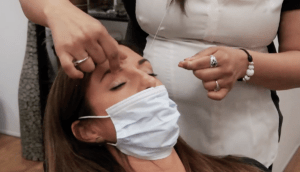 Case Info & Legal Team
Case Info & Legal TeamThis case is about three entrepreneurs and the right to earn an honest living, free from unreasonable government restrictions. In Kansas, it is a crime to remove a single eyebrow with a piece of cotton thread, unless the threader holds a license. It is a crime to hire an unlicensed eyebrow threader.
Jigisha simply wants to hire her mother-in-law, Jyotsna, but can’t. Kansas law requires a government issued permission slip just to be able to use a single piece of cotton thread to groom an eyebrow. The American Dream shouldn’t be crushed by unreasonable rules and regulations like these. What’s happening is unfair and unreasonable, and that’s why Kansas Justice Institute is helping Jigisha, Jignesh, and Jyotsna fight back. – Sam MacRoberts, Litigation Director of Kansas Justice Institute
Eyebrow threading is a safe and simple technique that uses a single strand of cotton thread to remove unwanted hair. It does not usually involve skin-to-skin contact and does not reuse the same tools on different customers.
 Eyebrow threading is an ancient grooming technique that dates back thousands of years to parts of South Asia and the Middle East. Eyebrow threading uses only a simple cotton thread to form loops as the threader gently removes unwanted facial hair. Threading is gaining popularity and in higher demand among those who have a skin sensitivity to facial waxing due to the swelling and irritation that often occurs with waxing. Since its arrival in the United States, threading has become increasingly popular, offering threaders countless opportunities for employment, entrepreneurship, and their own chance at the American dream.
Eyebrow threading is an ancient grooming technique that dates back thousands of years to parts of South Asia and the Middle East. Eyebrow threading uses only a simple cotton thread to form loops as the threader gently removes unwanted facial hair. Threading is gaining popularity and in higher demand among those who have a skin sensitivity to facial waxing due to the swelling and irritation that often occurs with waxing. Since its arrival in the United States, threading has become increasingly popular, offering threaders countless opportunities for employment, entrepreneurship, and their own chance at the American dream.
Despite the simplicity and ease of threading, Kansas law requires eyebrow threaders to obtain an esthetician’s license. This license requires a threader to complete at least 1,000 hours of instruction at an expensive esthetician school. Making matters worse, hundreds of hours are spent learning cosmetology methods that threaders do not use or need. It is estimated that .66% of the schooling is devoted exclusively to threading if it is even taught at all. Kansas law also requires aspiring threaders to pass examinations even though threading is barely tested, if it is tested at all. As a result, aspiring threaders are required to endure hundreds of hours of irrelevant training, take irrelevant examinations, and spend thousands of dollars on schooling, examinations, and fees just to be able to use a single piece of cotton thread to groom an eyebrow.
The Kansas Constitution forbids outrageous occupational licensing regimes like this one and protects the right to earn an honest living. Kansans have the right to be free from unreasonable and oppressive laws. – Sam MacRoberts, Litigation Director of Kansas Justice Institute
Jigisha Modi is a licensed cosmetologist and operates Miracle Eyebrows, a licensed esthetics business in Olathe, Kansas. She and her husband Jignesh Biscuitwala run the business together.
Jigisha Modi immigrated to the United States in 1997 with the ambition to experience the American dream. She obtained her cosmetology license and started her own business.
Jyotsna Biscuitwala, who is Jignesh’s mother and Jigisha’s mother-in-law, has nearly thirty years of threading experience. She taught her daughter-in-law, Jigisha, the art of threading and desperately wants to work for Jigisha and her son, Jignesh, in their threading salon. However, Jyotsna does not have a license from the Kansas Board of Cosmetology and is unable to obtain one.
Jigisha runs the day-to-day operations of the salon. The salon offers primarily threading services, but because Jigisha is a licensed cosmetologist, she offers other services as well. She makes managerial decisions with her husband, Jignesh, including hiring decisions. It is extremely difficult for Jignesh and Jigisha to find licensed estheticians who are willing and interested in performing eyebrow threading services.





